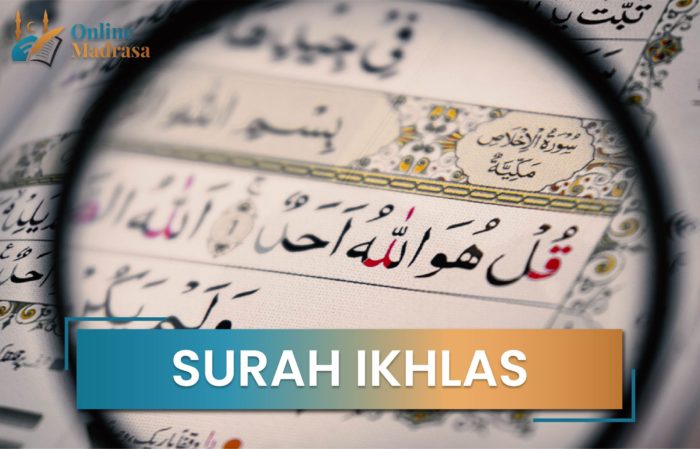Surah Ikhlas

Surah al-Ikhlas, or “Sincerity” or “trueness”, is the 112th Surah of the Quran, it consists of four verses. Surah Ikhlas centers on the oneness and solidarity of God and that all and everybody requires Him for their existence and wellness in this world and hereafter. Surah Ikhlas portrays God does not have any accomplices, not in His quintessence, or His attributes and nor in His activities.
The unity or Tawhid referenced in this Surah is explicit and situated in the Holy Quran itself and all other Islamic lessons have been established on this.
Significance of Surah Ikhlas
Surah Ikhlas (سوره اخلاص) is one of the main parts of the Quran since it discusses one of the mainstays of beliefs of Islam, i.e. the solidarity and unity of God or monotheism. It is a Surah that depicts God and His characteristics and acquaints Him with us as He might want us to know Him. Consequently,
it is of indispensable significance for each Muslim to peruse and attempt to comprehend the significant lessons given to us in this part. Accordingly, this article digs into this Surah and tries to provide an acquaintance, extremely essential, for it. We are going to have a close look at the conversation of Tawhid (توحید), which is the focal topic of Surah Ikhlas, and its significance.
Translation of Surah Al Ikhlas
بِسْمِ ٱللَّهِ ٱلرَّحْمَٰنِ ٱلرَّحِيم
In the name of Allah, the most compassionate, most merciful
قُلْ هُوَ اللَّهُ أَحَدٌ ﴿1﴾
Say: He, Allah, is One,
اللَّهُ الصَّمَدُ ﴿2﴾
Allah is He on Whom all depend,
لَمْ يَلِدْ وَ لَمْ يُولَدْ ﴿3﴾
He begets not, nor is He begotten,
وَ لَمْ يَكُن لَّهُ كُفُوًا أَحَدُ ﴿4﴾
Nor has He any equal.
Tafseer of Surah Al Ikhals
[1 Say: He is Allah, the One!
This verse asserts the Oneness of Allah. It summarizes the quintessence of Islam and refutes all types of polytheism and worshipful admiration. “Ahad” signifying “The One” is utilized in the Quran just for Allah, and nobody else. As Allah Almighty says in Surah al-Isra: [3]
“And your Lord has decreed that you worship none but Him.”
2] Allah is He on Whom all depend,
In this stanza, Allah refers to Himself by one of His Perfect credits: As-Samad.
As-Samad too is one of the Names of Allah.
Allah has been alluded to as The Eternal Refuge, The Self-Sufficient, The Absolute, and the One on Whom all depend and to Whom all creation goes to for the satisfaction of their longings and necessities, by various interpreters of the Quran.
Consequently, the entire world is reliant upon Allah for the satisfaction of its requirements, but He needs nobody. As referenced in Surah an-Naml:
“Truly my Lord is Free of all Needs, Supreme in Honor!”
3] He begets not, nor is He begotten,
This verse asserts that Allah was not conceived, nor did He conceive an offspring. To be specific, He has no start and accordingly no completion. Allah is the Creator of each and everything, except He, was not made by any force.
One may ponder: isn’t it pretty clear that Allah, the Ultimate Authority, is above all the other things? It definitely is self-evident. But numerous polytheists and misguided worshipers unfairly attribute accomplices just as children and girls to Allah (Nauzubillah!). However, this specific stanza of Surah al-Ikhlas rules out any ambiguity in such a manner.
4] Nor has He any equal,
The last verse of this Surah states that Allah is past any comparison. There isn’t anything and anyone equivalent to Him in nature and qualities. There is none in the whole universe, nor at any point was, nor at any point be, who is equivalent to Allah. He is Unique in each perspective. In Surah al-Shurah, Allah says:
“There is nothing like Him.”
Consequently, this Surah gives a summed-up depiction of the Oneness of Allah and the Perfection of His Attributes.
Surah Ikhlas Wazeefa
Surah Ikhlas Wazeefa is very mighty and has lots of blessings for the reciter.
The Prophet Muhammad (P.B.U.H) said:
“Whoever recites Surah Ikhlas ten times, Allah will build for him a house in Paradise.”
_ (Sahih al-Jami’ al-Saghir, 6472).
The Holy Prophet (P.B.U.H) once told a poor person to always say “Salaam” when entering his house, even if there was nobody in the house, and then Recite Surah Ikhlas, after a few days the man became abundantly prosperous.
If a person recites Surah Ikhlas 100 times, all his sins for the past 25 years are forgiven by Allah.
It is a defensive shield against all kinds of present and upcoming afflictions and problems.
If someone recites this Surah Ikhlas 3 times before going to bed, Allah will bestow him with the benefits of reading the whole Quran.
If this Surah is recited and blown on the eyes of a person suffering eye-sore, he would be cured by the mercy of Allah Almighty.
